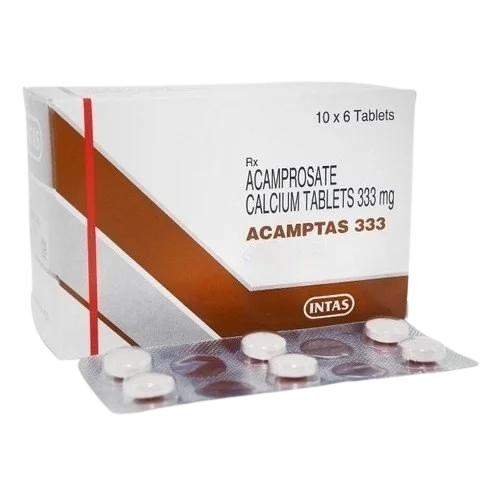Acamptas is non-addictive and does not produce euphoria, sedation, or dependence. Clinical studies have shown proven efficacy that Acamprosate significantly increases the duration of abstinence in individuals who have stopped drinking. Acamptas have a low risk of interaction with other medications, making it a safer choice for people undergoing multiple treatments.
It is safe in patients with mild-to-moderate liver impairment, as the body eliminates it through the kidneys. Acamptas has a favorable side-effect profile, with the most common side effects being mild (e.g., diarrhea and nausea). It does not cause drowsiness, cognitive impairment, or weight gain, allowing patients to maintain their daily routines. Acamptas does not require the patient to be completely abstinent before starting therapy, though it works best in those who have already quit drinking.
What is Acamptas 333mg?
Acamptas 333 mg (Acamprosate calcium) works by modulating neurotransmitter systems in the brain to restore balance disrupted by chronic alcohol use. Acamprosate modulates brain chemistry, helping to restore the balance between excitatory (glutamate) and inhibitory (GABA) neurotransmitters disrupted by long-term alcohol use. Unlike other medications for alcohol dependence, it does not act on dopamine or opioid pathways, minimizing the risk of addiction.
How does Acamptas work?
Glutamate System Regulation
Acamprosate acts as an NMDA receptor antagonist and modulates glutamate activity. It reduces excessive glutamate transmission caused by alcohol withdrawal, which prevents hyperexcitability and neurotoxicity.
GABAergic System Modulation
It enhances GABA-A receptor-mediated inhibitory signaling, countering the decreased GABAergic activity seen in alcohol dependence. It helps restore the inhibitory-excitatory balance in the brain.
Neuroplasticity and Stabilization
By regulating glutamate and GABA, Acamprosate stabilizes neuronal signaling and reduces the neuroadaptive changes induced by long-term alcohol exposure. This mechanism aids in reducing cravings and preventing relapse by normalizing disrupted neural pathways without acting on dopamine or opioid systems.
What are the Uses and Benefits of Acamptas 333mg?
Key Uses
Maintaining Abstinence from Alcohol
Acamprosate helps reduce the craving for alcohol by restoring the balance of neurotransmitters in the brain disrupted by long-term alcohol use.
Preventing Relapse
Acamptas reduces the likelihood of returning to heavy drinking after quitting.
Benefits of Acamptas 333 mg
Supports Long-Term Recovery
Acamptas aids in maintaining sobriety when combined with therapy or counseling.
Reduces Alcohol Cravings
Acamptas lessens the desire to consume alcohol, making it easier to resist triggers.
Well-Tolerated
Acamptas has minimal side effects when taken as prescribed, with no significant risk of addiction.
Non-Sedative
Acamptas does not cause drowsiness or impair cognitive function, making it safe for daily use.
Improved Quality of Life
Acamptas helps rebuild physical and mental health after prolonged alcohol abuse.
What are the Safe Dosages of Acamptas?
Standard Doses of Acamptas
Adults (Above 60 kg Body Weight)
333 mg tablet: Two tablets three times daily (Total: 1998 mg per day)
Adults (Below 60 kg Body Weight)
333 mg tablet: One tablet three times daily (Total: 999 mg per day)
Dosage Schedule
You can take the medication with or without food. To ensure consistent blood levels, space the doses evenly throughout the day (e.g., morning, afternoon, and evening). Doctors prescribe Acamptas as part of a long-term treatment plan for alcohol dependence. It is most effective when combined with therapy or support programs.
Missed Dose
If you miss a dose, take it as soon as you remember unless it’s almost time for the next dose. Do not double the dose.
Adjustment for Kidney Function
Patients with mild-to-moderate kidney impairment may require dosage adjustments. Acamptas is not for patients with severe kidney impairment.
Pediatric Use
Medical science has not established its safety and effectiveness in individuals under 18.
How to take Acamptas 333mg?
When to Start
Begin taking Acamptas after you have successfully stopped drinking alcohol. It is ineffective in reducing cravings if alcohol the user continues to consume it.
Dosage Frequency
Take two tablets (666 mg) 3 times daily if your weight is over 60 kg.
If your body weight is less than 60 kg, take one tablet (333 mg) 3 times daily.
Always follow the dosage as prescribed by your doctor. You can take Acamptas with or without meals. If you experience gastrointestinal discomfort, taking it with food may help. Take the doses by evenly spacing the dosages across intervals throughout the day, e.g., morning, afternoon, and evening. For the best results, take the medication at the same time each day to maintain stable drug levels in your system. Swallow Whole. Do not chew or crush the tablets. Swallow them whole with a glass of water. Do Not Drink Alcohol. Acamptas is most effective when used after you have already stopped drinking alcohol.
Part of a Treatment Plan
Combine the medication with counseling, therapy, or support groups to achieve long-term abstinence.
When Should I Avoid Acamptas 333mg or use Acamptas 333mg cautiously?
Avoid Acamptas 333 mg If
Severe Kidney Impairment
Acamptas contraindication in individuals with severe kidney dysfunction (creatinine clearance ≤ 30 mL/min).
Allergic Reactions
Avoid if you have a known allergy or hypersensitivity to Acamprosate or its ingredients.
Alcohol or Drug Consumption
Acamptas is not suitable for use while still actively consuming alcohol or other substances. Acamptas help maintain total abstinence.
Pregnancy
Avoid using it during pregnancy. Consult your doctor if you are pregnant or planning to conceive.
Breastfeeding
Avoid Acamptas if you are breastfeeding, as it is unclear whether the drug passes into breast milk.
Use Acamptas 333 mg Cautiously If
Mild-to-Moderate Kidney Impairment
Doctors may need dosage adjustments for those with kidney conditions but not severe impairment (creatinine clearance between 30 to 50 mL/min).
Elderly Patients
Use it with caution in older adults because of potential changes in kidney function or interactions with other medications.
History of Depression or Suicidal Thoughts
Acamptas may cause mood changes. Doctors, while prescribing Acamptas, should monitor patients with a history of mental health issues.
Concurrent Medications
Inform your doctor if you are taking other medications, especially those for mental health conditions, epilepsy, or pain management, to avoid drug interactions.
Not a Standalone Solution
Acamptas is part of a broader treatment plan and works best when combined with therapy, counseling, or support groups.
Not for Children or Adolescents
Acamptas is not for individuals under 18, as no medical findings established its safety and efficacy in this group.
What are the Side effects of Acamptas 333mg?
Common Acamptas 333mg Side Effects
- Diarrhea (most commonly reported)
- Nausea or vomiting
- Abdominal pain or discomfort
- Flatulence (gas)
- Headache
- Dizziness
- Fatigue
- Insomnia (difficulty sleeping)
- Anxiety
- Depression or mood changes (rare but possible)
- Itching
- Rashes
- Muscle or joint pain
- Changes in libido (rare)
Severe Acamptas 333mg Side Effects
- Depression
- Suicidal Thoughts or Behavior
- Severe anxiety or agitation.
- Swelling of the face, lips, tongue, or throat (angioedema).
- Difficulty breathing or shortness of breath.
- Severe rash, hives, or itching.
- Persistent or severe diarrhea leads to dehydration.
- Intense abdominal pain or cramping.
- Confusion or difficulty concentrating.
- Severe dizziness or fainting spells.


